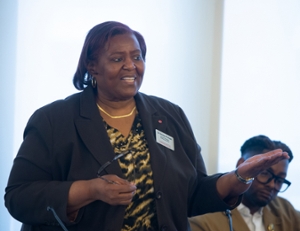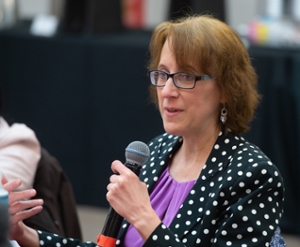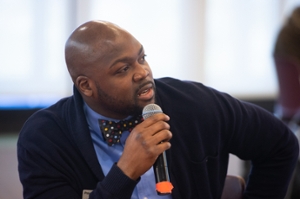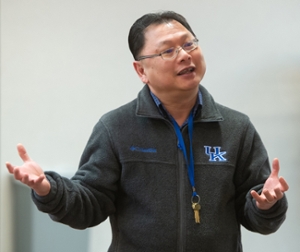 Personal accounts of prejudices, frank conversations about injustice and inequality, and strategies on how to lessen the effects of biases were discussed Friday, March 22 at Southern Illinois University Edwardsville’s Diversity and Inclusion Spring Summit, “Implicit Bias and Institutional Change: Who Am I at SIUE?”
Personal accounts of prejudices, frank conversations about injustice and inequality, and strategies on how to lessen the effects of biases were discussed Friday, March 22 at Southern Illinois University Edwardsville’s Diversity and Inclusion Spring Summit, “Implicit Bias and Institutional Change: Who Am I at SIUE?”
“This conference is meant to build on SIUE’s efforts and commitment to diversity and inclusion,” said Venessa A. Brown, PhD, associate chancellor and chief diversity officer.
The Office of Institutional Diversity and Inclusion sponsored the summit, which was moderated by three of the four members of the new SIUE Diversity and Inclusion  Leadership Team: Brown, Jessica Harris, PhD, interim assistant provost, and Courtney Boddie, PhD, director of Counseling Services. Also on the leadership team is Timothy Staples, EdD, director of the Center for Student Diversity and Inclusion and interim director of the SIUE East St. Louis Center.
Leadership Team: Brown, Jessica Harris, PhD, interim assistant provost, and Courtney Boddie, PhD, director of Counseling Services. Also on the leadership team is Timothy Staples, EdD, director of the Center for Student Diversity and Inclusion and interim director of the SIUE East St. Louis Center.
“It’s good to keep having these conversations, because they are extremely important,” said SIUE Chancellor Randy Pembrook, PhD. “In SIUE’s core values, specifically the one relating to inclusion, we are committed to creating an environment that is welcoming, supportive and reflects openness and respect.”
One of the several videos shown to conference participants provided the following definition and explanation of bias, “Implicit bias exists when we unconsciously hold beliefs  toward others or associate stereotypes toward others. Unconscious bias is deep-seated in the brain. Those affected can be racial groups, genders, the LGBTQ community and other marginalized groups. People can be explicitly unbiased while being implicitly biased.”
toward others or associate stereotypes toward others. Unconscious bias is deep-seated in the brain. Those affected can be racial groups, genders, the LGBTQ community and other marginalized groups. People can be explicitly unbiased while being implicitly biased.”

Darryl Cherry, Student Opportunities for Academic Results (SOAR) retention coordinator, and Prince Robertson, assistant director of Student Conduct in the Office of Student Affairs, shared stories of being pre-judged, challenged, feared and negated as African American men.
Anita Joy, PhD, associate professor and chair of the Department of Growth, Development and Structure at the SIU School of Dental Medicine, pointed out that her identities can be magnified or marginalized based on her location and with whom she is interacting.
Samantha Dickens, Prevention Education and Advocacy Center (PEACe) coordinator, talked about being judged for her agnostic beliefs when living in the south.
Yvonne Hart, program director of Upward Bound Scholar’s Academy at the SIUE East St. Louis Center, spoke about the duality of being a mother with a career.
“In some cases, people will think you can’t handle your workload, because you have children. Or being a woman or a mother can get in the way of promotions,” said Hart. “Then when I got to the age of 40, I thought I would have some respect, but there are people who think you’re too old.”
“Being a confident woman with an opinion that is respected can also be problematic, especially in the workplace,” said Terra Cole Brown, graduate program advisor in the Office of Graduate Admissions.
“I’m listening to the professional women in the room, and it really strikes me,” said Greg Budzban, PhD, dean of College of Arts and Sciences. “I don’t have to hide anything. I am a walking package of privilege. What do I do with that, other than being as sensitive as possible?”
Brown offered Budzban and summit participants the following strategies for addressing biases:
- Be aware
- Question others and yourself about your beliefs and biases
- Create inclusive practices
- Create supportive dialogue
- Take action
“We all have biases,” said Harris, “but we can work on them. It is hard and difficult work, and it is an ongoing process.”
“As was touched on in this summit today, place matters,” concluded Pembrook. “Location can affect how a person feels about and defines themselves. SIUE is a place. It can be a different place. It can be a better place. We can’t control what happened to people 20 years ago, but we can work to make SIUE a place where people have a better experience.”
Photos:
Venessa A. Brown, associate chancellor and chief diversity officer, was one of the moderators of SIUE’s Diversity and Inclusion Spring Summit, “Implicit Bias and Institutional Change: Who Am I at SIUE?”
Jessica Hinz, PhD, associate professor and director for Campus Wellness, Cultural Awareness, Diversity and Ethics at the SIU School of Dental Medicine, offers her insights.
Prince Robertson, assistant director of Student Conduct in the Office of Student Affairs, talks about some of his negative experiences as an African American male.
Wai Hsien Cheah, PhD, professor in the Department of Applied Communication Studies, asks how to get those who are not as inclined to be concerned with implicit biases to join the conversation and the work.